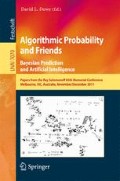Abstract
Ray Solomonoff invented the notion of universal induction featuring an aptly termed “universal” prior probability function over all possible computable environments [9]. The essential property of this prior was its ability to dominate all other such priors. Later, Levin introduced another construction — a mixture of all possible priors or “universal mixture”[12]. These priors are well known to be equivalent up to multiplicative constants. Here, we seek to clarify further the relationships between these three characterisations of a universal prior (Solomonoff’s, universal mixtures, and universally dominant priors). We see that the the constructions of Solomonoff and Levin define an identical class of priors, while the class of universally dominant priors is strictly larger. We provide some characterisation of the discrepancy.
Access this chapter
Tax calculation will be finalised at checkout
Purchases are for personal use only
Preview
Unable to display preview. Download preview PDF.
References
Chaitin, G.J.: A theory of program size formally identical to information theory. Journal of the ACM 22, 329–340 (1975)
Downey, R.G., Hirschfeldt, D.R.: Kolmogorov complexity of finite strings. In: Algorithmic Randomness and Complexity, pp. 110–153. Springer, New York (2010)
Figueira, S., Stephan, F., Wu, G.: Randomness and universal machines. Journal of Complexity 22(6), 738–751 (2006)
Hutter, M.: Universal artificial intelligence: Sequential decisions based on algorithmic probability. Springer (2005)
Hutter, M.: On universal prediction and Bayesian confirmation. Theoretical Computer Science 384(1), 33–48 (2007)
Levin, L.A.: Some Theorems on the Algorithmic Approach to Probability Theory and Information Theory. Phd dissertation, Moscow University, Moscow (1971)
Li, M., Vitányi, P.: An Introduction to Kolmogorov Complexity and Its Applications, 3rd edn. Springer (2008)
Schnorr, C.: Process complexity and effective random tests. Journal of Computer and System Sciences 7(4), 376–388 (1973)
Solomonoff, R.J.: A formal theory of inductive inference. parts I and II. Information and Control 7(2), 224–254 (1964)
Solomonoff, R.J.: Complexity-based induction systems: Comparisons and convergence theorems. IEEE Transactions on Information Theory 24(4), 422–432 (1978)
Turing, A.: On computable numbers, with an application to the Entscheidungsproblem. Proceedings of the London Mathematical Society 42(2), 230–265 (1936)
Zvonkin, A.K., Levin, L.A.: The complexity of finite objects and the development of the concepts of information and randomness by means of the theory of algorithms. Russian Mathematical Surveys 25(6), 83–124 (1970)
Author information
Authors and Affiliations
Editor information
Editors and Affiliations
Rights and permissions
Copyright information
© 2013 Springer-Verlag Berlin Heidelberg
About this chapter
Cite this chapter
Wood, I., Sunehag, P., Hutter, M. (2013). (Non-)Equivalence of Universal Priors. In: Dowe, D.L. (eds) Algorithmic Probability and Friends. Bayesian Prediction and Artificial Intelligence. Lecture Notes in Computer Science, vol 7070. Springer, Berlin, Heidelberg. https://doi.org/10.1007/978-3-642-44958-1_33
Download citation
DOI: https://doi.org/10.1007/978-3-642-44958-1_33
Publisher Name: Springer, Berlin, Heidelberg
Print ISBN: 978-3-642-44957-4
Online ISBN: 978-3-642-44958-1
eBook Packages: Computer ScienceComputer Science (R0)

